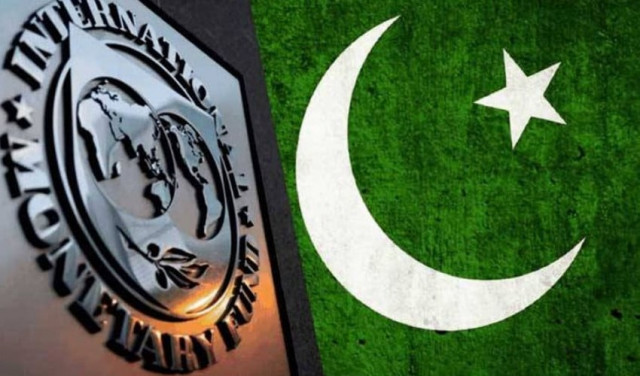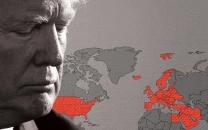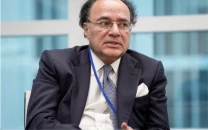IMF mission to meet JCP, SC representatives
Exercise to assess governance framework

The International Monetary Fund has sent a mission to Pakistan to undertake a comprehensive governance and corruption assessment, including a review of the process of appointment of judges, judicial integrity and its independence.
The first of its kind detailed mission -- Pakistan Governance and Corruption Diagnostic Assessment -- began its work on Thursday. It will conclude the exercise on February 14, the government and the diplomatic sources told The Express Tribune.
During its stay in Pakistan, the IMF team will meet with the representatives of at least 19 government ministries, departments and state organs, including with the Judicial Commission of Pakistan and the Supreme Court of Pakistan.
The focus of the mission remains on rule of law, anti-corruption, financial oversight, eradicating well-entrenched vested interests in the state's governance structure and combating money laundering, according to the sources.
The mission had been planned in September last year, but it came at a critical time when the judges of the Islamabad High Court and the Supreme Court of Pakistan have raised concerns about the appointment process of judges in the superior judiciary.
The 26th Constitutional Amendment has brought fundamental changes in the process of the appointment of the judges, giving a role to the politicians in the selection process.
The sources said that the mission will hold a meeting with the judicial commission next week and discuss the process of appointment of judges. It also plans to meet with the Supreme Court of Pakistan to make an assessment about the judicial integrity and independence -- the two areas that are critical.
The mission will finalise its assessment and its report will be published by July 2025. Under the $7 billion deal, Pakistan is obligated to publish the full report of the Governance and Corruption Diagnosis by July.
Pakistan has also committed with the IMF that with the capacity development support of the global lender, it "will undertake a Governance and Corruption Diagnosis Assessment to analyze critical governance and corruption vulnerabilities and identify priority structural reforms moving forward".
The IMF will meet with the National Accountability Bureau to discuss the National Anti-Corruption Strategy, Nature and Severity of Corruption, Anti-Corruption Law Enforcement, including money-laundering investigation and prosecution.
"Effective governance frameworks and independent anti-corruption institutions are critical to overcoming poor policy making, mitigating undue influence of vested interests, and sustaining hard-fought structural reforms," according to the IMF.
The IMF said that Pakistan's vulnerabilities and structural challenges remain formidable. A difficult business environment, weak governance, and an outsized role of the state hinder investment, which remains very low compared to peers.
The IMF is also meeting with the Financial Monitoring Unit to make an assessment about the suspicious transactions reporting from the obligated entities, dissemination of financial intelligence, resources and capacity to tackle these challenges.
Another main focus of the mission is the money laundering proceeds of domestic corruption and whether Pakistan has any effective risk mitigation strategy and action plan to overpower this challenge.
The mission will meet with the National Anti-Money Laundering Authority and Combating Financing of Terrorism Authority. The sources said that the focus of the discussion will be the money laundering proceeds of domestic corruption.
A crucial meeting will take place with the Ministry of Law and Justice to make an assessment about the status of the rule of law. The IMF will make an assessment about the need for any legal reforms to ensure the rule of law through the independence of judiciary, property rights protection and contract enforcement.
The mission will have multiple meetings with the State Bank of Pakistan, some of those have already taken place this week, said the sources. The central bank has given an overview of the key challenges and reform priorities related to governance and anti-corruption of SBP, banking sector and its supervision.
The central bank's legal framework and governance arrangements have also been discussed and further discussions will take place on the current laws and any need to amend those to improve governance.
The mission will undertake the review of the banking policy group's organization, regulatory decision-making; regulatory framework, including for governance-related topics; and the regulatory framework for state-owned banks.
The central bank is often seen as protecting the interests of the commercial banks at the expense of the depositors and the economy. It has not taken effective and meaningful actions against the commercial banks for their involvement in a money laundering scam through the import of solar panels. The banks were also not punished two years ago when they manipulated the price of the US currency against the rupee.
The IMF mission will also ask for a briefing on the banking supervision, organization, resourcing, information technology systems, legal protection for supervisors, and supervisory decision-taking. It will review the supervisory framework for corporate governance and transactions with related parties and other governance-related topics; supervision of state-owned banks.
The Islamic banking and the anti-money laundering and combating of financing of terrorism, the banking payment system, the government and banks' arrangement and the treasury single account issue will also come under the review, said the sources.
The IMF will have multiple meetings with the FBR with a main focus on utilization of asset declaration databases, money laundering supervision and preventive measures by Designated Non-Financial Businesses and Professions (DNFBPs). The IMF will review the governance risks in tax policy making and implementation.
A meeting will take place with the Federal Land Commission to assess the governance parameters in the land management.
It has scheduled meetings with the Ministry of Climate Change, Ministry of Housing to ensure property rights are protected and with the Securities and Exchange Commission of Pakistan. The SECP meetings will focus on beneficial ownership related transparency for companies and their supervision and preventive measures against money laundering by non-banking financial institutions.
The IMF will meet with the department of the Auditor General of Pakistan, the Establishment Division to review its Anti-Corruption structure for asset declaration system of the bureaucrats and with the National Disaster Management Authority to climate Adaptation Policies and Projects.
The IMF will meet with the Privatization Commission to assess the SOEs and various managed funds.
Multiple meetings are also planned with the Finance Ministry to have an overview of the budget preparation and execution and current reforms; overview of the treasury functions including budget execution, accounting, TSA, cash management, and debt management.
The Ministry of Planning meeting will focus on Public Investment Management, Public Sector Development Programme and the Public Private Partnership arrangements
A meeting is also planned with the Ministry of Economic Affairs to discuss external debt, coordination of debt management with the Ministry of Finance including debt data collection and publication.



















COMMENTS
Comments are moderated and generally will be posted if they are on-topic and not abusive.
For more information, please see our Comments FAQ